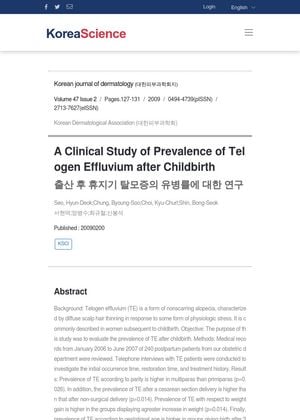A Clinical Study of the Prevalence of Telogen Effluvium After Childbirth
January 2009
in “
Journal of Clinical Dermatology
”

TLDR Hair loss after childbirth is more common in women who have had multiple births, cesarean deliveries, significant weight gain, and full-term pregnancies.
The study, conducted from January 2006 to June 2007, reviewed medical records of 240 postpartum patients to evaluate the prevalence of Telogen Effluvium (TE), a form of nonscarring alopecia characterized by diffuse scalp hair thinning after childbirth. The results showed that the prevalence of TE was higher in multiparas (women who have given birth more than once) than primiparas (women who have given birth once) (p=0.026). It was also found that the prevalence of TE was higher after a cesarean section delivery than after non-surgical delivery (p=0.014), and in groups with a greater increase in weight (p=0.014). Additionally, TE prevalence was higher in groups giving birth after 38 weeks gestational age (p=0.015). Therefore, the prevalence of TE may be associated with multiparity, cesarean section, marked weight gain, and high gestational age.





